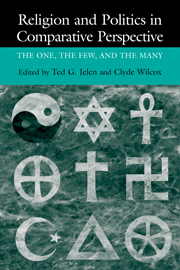Book contents
- Frontmatter
- Contents
- List of Contributors
- Preface
- 1 Religion: The One, the Few, and the Many
- 2 The Challenge of Pluralism
- 3 Catholicism, Politics, and Culture in the Republic of Ireland
- 4 Religion and Politics in Iberia
- 5 The Religious Dimension of Israeli Political Life
- 6 Between Heaven and Earth
- 7 Islamism in Contemporary Arab Politics
- 8 Religion and Politics in a Secular Europe
- 9 Religion and Democracy in South America
- 10 Looking for Hope in Central America
- 11 Religion and Politics in India
- 12 Religion and Politics in Japan
- 13 Religion and Politics in an Open Market
- 14 The Political Roles of Religion
- Index
3 - Catholicism, Politics, and Culture in the Republic of Ireland
Published online by Cambridge University Press: 05 June 2012
- Frontmatter
- Contents
- List of Contributors
- Preface
- 1 Religion: The One, the Few, and the Many
- 2 The Challenge of Pluralism
- 3 Catholicism, Politics, and Culture in the Republic of Ireland
- 4 Religion and Politics in Iberia
- 5 The Religious Dimension of Israeli Political Life
- 6 Between Heaven and Earth
- 7 Islamism in Contemporary Arab Politics
- 8 Religion and Politics in a Secular Europe
- 9 Religion and Democracy in South America
- 10 Looking for Hope in Central America
- 11 Religion and Politics in India
- 12 Religion and Politics in Japan
- 13 Religion and Politics in an Open Market
- 14 The Political Roles of Religion
- Index
Summary
The Irish Republic is an independent, sovereign, and democratic state, and is legally, politically, and economically separate from Northern Ireland. The Republic of Ireland is a small (approximately 3.5 million people) and relatively homogeneous society (91 percent Catholic), in which Catholicism has played a historically dominant role in articulating national identity. The reach of Catholicism is well inscribed both institutionally (in law, education, social policy, etc.) and in the Irish collective memory, and its symbols and meanings provide a powerful, common-sense interpretive framework for everyday life.
CATHOLICISM AND IRISH IDENTITY: HISTORICAL BACKGROUND
The long tradition of Catholicism in Ireland, and its historical coexistence with the struggle against British colonialism critically shaped Irish political and cultural identity. Following the arrival of the British-born missionary, Patrick, in the fifth century, Ireland developed a vibrant religious culture that included a vigorous monasticism. The monasteries were centers of religious and cultural learning, and Irish monks established many similar houses in Europe until the Golden Age of the Irish Church dissipated in the ninth century following successive Viking conquests and their targeting of the monasteries' riches. Whether or not Irish monasticism “saved civilization” as the best-selling author Thomas Cahill (1995) contends, the legacy of the monks endured in Ireland's collective memory with its self-representation as the “Island of Saints and Scholars.” This identity reaffirmed for successive Irish generations that they were the inheritors and preservers of a distinct Catholic heritage that should not be compromised by the impure forces of modernity and secularism.
- Type
- Chapter
- Information
- Religion and Politics in Comparative PerspectiveThe One, The Few, and The Many, pp. 45 - 68Publisher: Cambridge University PressPrint publication year: 2002
- 2
- Cited by



